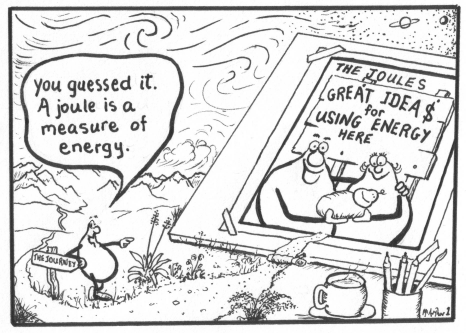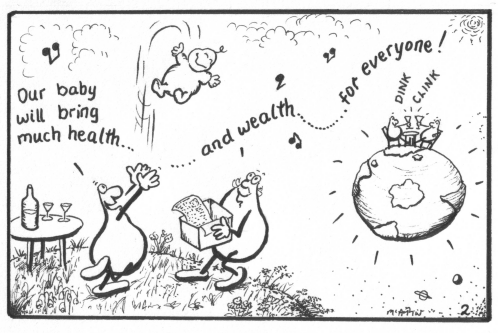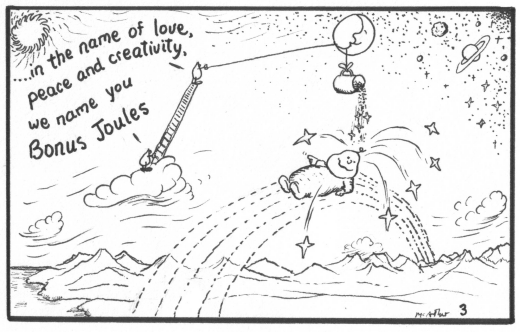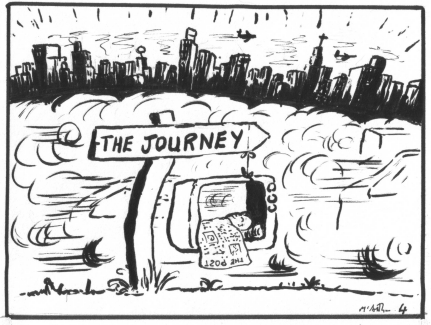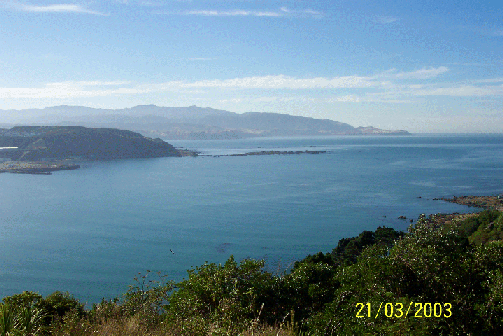|
Bonus Joules and the Knowledge Economy |
|||||
|
My
Parents Click on any cartoon.
Bonus Joules and the Knowledge Economy: All images on this site are copyright 2001 BLOG Jan 3 2005 Flashback
c1995. She has been hired to give this disparate bunch of individuals “career change advice”, this ledger load of ‘liabilities’ that must be erased from the corporation’s books if it is to achieve maximum market value according to the edicts of Arthur Andersen and Co. Many of us are over 40 years old and have no function in the new Corporate Order created by the Reforms. NZ Treasury officials dismiss us as the "Lost Generation". Job search advice and CVs are easy. Sustaining our spirits is not. She does not preach. She tells her story with hesitation and humility. Of how she dreamed of becoming a scientist. Of how with years of study she achieved her dream. She became an expert in her field. Her skills, her knowledge, her dreams became one and she was paid to pursue what she loved most. Then the Reforms “restructured” her career out of existence. Funding ceased. Her life’s work ended. She spoke of her desolation. And what had sustained her. Even the most cynical and hard-bitten among us is listening now. She hesitates again and then tells us she was most sustained by what some might describe as a prayer. She makes it clear she is not putting on us a God or an outside guiding force or anything in particular. In her worst moments she described how she simply asked for advice and assistance. I cannot remember which “prayer” she taught us. It might have been to ask, “What would you have me do? Where would you have me go? What would you have me say and to whom?” If it was not that, then it was “That I might have the strength to do what I can do, the humility to accept what I cannot do and the wisdom to know the difference between.” Maybe she taught me both. Feb 6 2000 and I “pray” all night. In times on intense grieving I am fortunate now to be able to resort to such open “prayers”. I sense tomorrow my partner will tell me what I have known for some months now. For her, our family is no more. Our daughter, residing back at back home after living in Italy, has been unable to look me in the eye and sidles past me if we meet since her return. Such is the pain of the knowledge she knows and I cannot tell her its Ok - I know. First I go to town to the dentist to get the sad news about my teeth. I arrive home to the “news” the family is finished and I am not to contact them again. My grief is intense. A perverted blessing is that at least my existence no longer puts them at risk of rape, firebombing and worse from the criminals who now have investments in the local electricity industry. I have no qualms about applying for the dole while I work through the grief. I have not had a holiday of more than two days since a week off in 1986. The Reforms meant I had received only 3 of the 16 years redundancy payout I was entitled to. Despite all accidents that occur with decades of highly physical I had only ever taken 4 days sick leave. I had served my country to the best of my ability and got punished for it. The dole officer takes one look at my glazed eyes when I come in to register and puts me on the sickness benefit. Three days of intense grief have patently left me unfit to work. The doctor says she must prescribe me with some medication to prove to WINZ she is treating me. I manage to convince her that tranquilisers and sleeping tablets only complicate and distort grieiving processes. I am quite sane, just in pain. The newly elected Labour Government is so “appalled” at the mess it inherits from what they describe as “Mad Max’s Reforms” of the New Zealand electricity industry that it sets up the 2000 Government Electricity? Commission of Inquiry in an “attempt to sort out the mess”. As part of my grieving process I decide to invest my first week in forming a submission. The people of New Zealand should know the sheer nastiness, injustice and corruption of the Electricity Reforms. In my written submission, made practically especially incoherent by aching bouts of tears, I even suggest there is a need for the Inquiry to take on the role of the South African Reconciliation Tribunal. I receive a phone call. Would I like to make a personal submission to the Inquiry? I am not a public person. Even the sight of a class of five year olds looking back at me reduces me to stumbling incoherency. What could a national Government Inquiry reduce me to? I know the chair of the Inquiry. David Caygill has been a family friend for over three decades and I trust him to give all people a kind hearing. At the same time he is one of the architects, even if he does not understand how, of the “mess” the country now finds itself in, the "mess" that the Commission has been created to address. What have I to lose? I have lost my family, my home, my career, my income, my job prospects, my superannuation, and my reputation. What more is there to lose? I spend the two days before my submission attending the Inquiry to see how they work. The teams making submissions for the new corporations particularly fascinate me. So beautifully dressed and manicured. So articulate and clever with their PowerPoint presentations. So well prepared and emanating influence. No more so than the team from TransAlta-NGC. They breathe confidence, connection, sophistication and culture. I am profoundly aware from my experiences of the culture they reign over of how their appearance deceives. Beneath their veneer of polished urbane concern there exists a vast ignorance of the misery and degradation they preside over. The corporate culture they represent does not know the meaning of love and is a fount of misery in communities. It is clear from the narrow range of knowledge evidenced in the Commission’s questions that the Inquiry is unable to confront the unsustainable structure of the Reformed Electricity Industry. Less still is it able to elicit creative solutions from the submissions. It is blind set on recommending more of the same. More indebted communities. More “supply-side” solutions. More disenfranchisement of the average citizen. More suppression of sustainable options. I am fascinated how all the questions seem so penetrating yet reveal so little. In my numbed state of grief though I find something reassuring and comforting in the clarity of the questions. It reminds me that I too have the potential to be an articulate being. Then another bout of weeping arises and envelopes me and I have to retire to the toilets till it subsides in its own time. At one point I pass David on the stairs at the Inquiry. Our grown children have known each other since birth, have chased each other around the back yard and have played in the old horse paddock together and have shared many meals together. I know he knows of the trauma and destruction of my family from a range of sources. This is not the place to talk. He stops and says one sentence with great directness and certainty, “ Remember. You can never know what good comes from bad”. It was the compassionate gleam in his eye rather than the sound of his voice that has stayed with me ever since. I give a personal submission. I do not speak well. I have hastily assembled notes I can barely see. I cannot match the sophisticated graphs and flow charts of the corporations and instead project a few hastily drawn cartoons onto the screen to make my point. I may never get to become a cartoonist now but I have an abiding faith that cartoons can communicate what no other media can. At the end of my submission I am vaguely aware that applause fills the room. The panel asks in most kind manner a few questions. I can only recall one question: when do I think “smart metering” will occur in New Zealand and how can it be afforded? The question floors me. How do I explain it was all potentially here but the Reforms have destroyed it, precisely and rigorously as they were designed to do? Clearly the panel does not understand the most fundamental truths of the Reforms to even ask such a question. Where do I start to explain to them? How do I reveal the seething sea of lies, deceits and violence that is the new “Electricity Market” in a few sentences? I reply that the $350 million pure profit that TransAlta gloats on its Calgary website that it made from its brief investment here would have gone a long way towards a pretty smart system in the Wellington region. Maybe I spoke a little sharply or maybe one panel member suddenly catches a glimpse the scale of the loss and corruption I allude to. She physically jolts as though a bolt of electricity hits her. I don’t know where to start to explain and so lamely resort to repeating an old technology aphorism that states the “smart metering” will not arrive as soon as we expect but its impact will be far greater than we can imagine when it arrives. Afterwards Molly Melhuish comes up to me and introduces herself. Molly is a one-person industry promoting effective uses of energy and is a local institution. I had noted that her presence somehow dominated the Inquiry, with the panel stopping to seek her comments or advice on occasion. Molly insists on driving me home. She tells me she has sat through countless Parliamentary Inquiries and had never experienced the room breaking out in applause in response to a submission before. It just did not happen. We stand in the empty bedroom of what was my daughter’s bedroom in what was our family home looking down on my beloved seas and coasts. She says she wants to introduce me to someone who might be able to use my talents. Through Molly I meet a remarkable man, a genius called Grant Dunford. I end up working for his firm Negawatt Resources Ltd. |
|||||
| L | |||||
